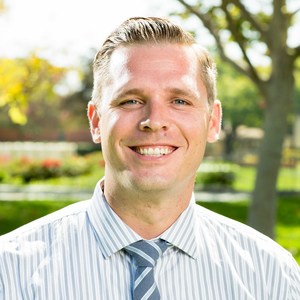The following is an excerpt from Thaddeus WilliamsÔÇÖ new book (Zondervan Reflect), a systematic theology text on the divine attributes in the tradition of PackerÔÇÖs Knowing God, ColsonÔÇÖs Loving God and PiperÔÇÖs Desiring God, complete with personal and small group study guides, along with personal testimonies from leading theologians ÔÇö including Fred Sanders, Michael Horton, Erik Thoennes, John Perkins and Joni Eareckson-Tada ÔÇö on how specific divine attributes have impacted their personal lives.
Every time I enter a lecture hall at Biola University, I commence the class with the same two words: ÔÇ£Greetings, theologians!ÔÇØ In the chairs sit art, film, communications, psychology, business, art, science and Bible majors, among others. Yet I greet all of them as theologians. ItÔÇÖs not a gimmick. I want every student who comes through my classroom to walk out with a sense that, as R. C. Sproul loved to say, ÔÇ£everyone is a theologian.ÔÇØ
But what else goes into this sacred task of theology? Five hundred years ago, Martin Luther famously listed six requirements. In one of his famous Table Talks (number 3425, to be exact), the stout German Reformer highlighted:
1. The grace of the Spirit.
2. Anfechtung, a German term for terrible dread or agonizing struggle as we realize our utter helplessness without God.[1]
3. Experience ÔÇö not just abstract pondering but real-life, transformative personal encounters with God in his Word and in a local flesh-and-blood community of fellow believers.
4. Opportunity ÔÇö spotting and taking daily moments to share gospel truths with others.
5. Consistent reading and study of sacred Scripture.
6. Broad engagement with other academic disciplines.
Two hundred years ago, former slave and the first black theologian ordained as a minister in the United States, offered five marks of a theologian:[2]
1. Love for Christ.
2. Wisdom, including knowing ÔÇ£the deceit in his own heartÔÇØ and ÔÇ£the intrigues of the enemy.ÔÇØ
3. Patience to withstand ÔÇ£the storms of temptationÔÇØ and ÔÇ£all the fatigues and sufferings to which his work exposes him.ÔÇØ
4. Courage and fearlessness in the face of opposition.
5. Vigilance not to fall asleep on the job but ÔÇ£to watch for the first motion of the enemy and give the alarm, lest souls perish through his drowsiness and inattention.ÔÇØ[3]
Solid lists no doubt. Allow me to build on Luther and Haynes. A theologian should also be marked by these five characteristics:
1. Idiocy
One of historyÔÇÖs seminal theologians, the apostle Paul, said, ÔÇ£Never be wise in your own sightÔÇØ (Rom. 12:16). He added, ÔÇ£ÔÇÿKnowledgeÔÇÖ puffs up, but love builds up. If anyone imagines that he knows something, he does not yet know as he ought to knowÔÇØ (1 Cor. 8:1ÔÇô2). Good theologians have the humility to acknowledge that on this side of eternity, we see in a ÔÇ£mirror dimlyÔÇØ (1 Cor. 13:12). If God is what Herman Bavinck called ÔÇ£an ocean of essence, unbounded and immeasurableÔÇØ[4] then the theologian knows he or she only offers mere drops from that infinite ocean ÔÇö precious, soul-hydrating, life-giving drops, but drops nonetheless. Charles Octavius Boothe concurred:
Before the charge ÔÇ£know thyself,ÔÇØ ought to come the far greater charge, ÔÇ£know thy God.ÔÇØ But, though the study of the being and character of God is a duty which we dare not disregard, still, let us not be unmindful of the fact that we vile, short-sighted worms should approach the solemn task of studying God with feelings of humility and awe. God is found [by] the lowly, but hides himself from the proud and self-sufficient man.[5]
2. Fanaticism
In a self-obsessed world, a world that champions creature worship over Creator worship, the theologian may very well come across as a fanatic in the original sixteenth-century Latin sense of fanaticus, ÔÇ£one inspired by a God,ÔÇØ and the seventeenth-century ÔÇ£zealous person, person affected by enthusiasm,ÔÇØ or the dictionary definition of ÔÇ£someone with excessive and single-minded zeal.ÔÇØ Good theologians recognize God as the summum bonum, AnselmÔÇÖs ÔÇ£something than which nothing greater can be thought,ÔÇØ[6] AugustineÔÇÖs ÔÇ£good of all things,ÔÇØ[7] EdwardsÔÇÖs ÔÇ£only happiness with which our souls can be satisfied,ÔÇØ[8] BavinckÔÇÖs ÔÇ£overflowing fountain of all goods.ÔÇØ[9] God is the Good behind every good, the Truth behind every truth, and the Beauty behind every beauty. The obsession, the fanatical longing, the insatiable thirst to enjoy more of our Maker, the stubborn refusal to settle for finite fixes are marks of good theologians.
3. Nerdiness
As fanatics seeking to know God, good theologians immerse themselves in GodÔÇÖs words. They ÔÇ£nerd outÔÇØ to Scripture. Jamie Love implores us to ÔÇ£go hard after the word of God. . . to devote yourselves to the study of GodÔÇÖs word for all your days, to labor to know the mind of God and to be conformed to it, to be bold in proclaiming GodÔÇÖs testimonies, to delight in the word of God, and to pursue obedience to the word of God for the sake of our character and conduct.ÔÇØ[10]
A good Lord of the Rings nerd spends so much time in TolkienÔÇÖs text. They can name the five Maiar (or wizards) sent to Middle-earth by the Valar, pontificate for hours about the mysterious Tom Bombadil, or lull you into deep REM sleep with facts about the origin and fate of all 20 Rings of Power. They love the story so dearly that they enjoy probing ever deeper into the text. So it is with those who love GodÔÇÖs story. They become holy nerds. In an age in which 12 percent of Americans think Joan of Arc was NoahÔÇÖs wife and 75 percent canÔÇÖt name the four gospels,[11] we need legions of holy nerds who love the inspired text.
4. Violence
We discover the aim of all this prayerful study of GodÔÇÖs word in Psalm 119: ÔÇ£I have stored up your word in my heart, that I might not sin against youÔÇØ (v. 11, emphasis added). The true theologian is not content with biblical insights until those insights make their way from the head and heart to the hands. Holy living to the glory of God is the end game of good theology.
When I say violence is a mark of a theologian, I do not mean physical violence or any form of violence against others. I mean, rather, what Paul spoke of when he said, ÔÇ£By the Spirit you put to death the deeds of the bodyÔÇØ (Rom. 8:13, emphasis added), ÔÇ£Put to death therefore what is earthly in youÔÇØ (Col. 3:5, emphasis added), and ÔÇ£Those who belong to Christ Jesus have crucified the flesh with its passions and desiresÔÇØ (Gal. 5:24, emphasis added). Good theologians are not perfect, but they do engage in what the Puritans called ÔÇ£mortification,ÔÇØ the Holy Spirit-powered effort to kill whatever sins haunt and terrorize their hearts. I know of no faster way to sever your head from your heart, no surer path to a dead orthodoxy, no quicker route to a spiritually barren, nihilistic wasteland, than to allow sin to go unchallenged and unmortified in oneÔÇÖs daily life.
5. Slavery
One of the most slickly advertised lies of our day is that there is such a thing as absolute freedom, that an individual can be lord of their own universe, servant to none. Self-glory, not servanthood, is the name of the game. When the delusion of self-lordship makes its way into the theological world, we end up with prima donna theologians chasing celebrity status. They gradually stop speaking hard truths from GodÔÇÖs Word for fear of upsetting their growing fan base. They become chameleons taking on the colors of mainstream culture. The spirit of the age eventually holds more sway in their hearts than the Spirit of truth. They catch the waves of the zeitgeist, which, like all other waves, will crash and leave them wiped out and irrelevant on the sand.
True theologians know both that they are servants and who it is they serve. They are mastered not by the zeitgeist ÔÇö the spirit of the age ÔÇö but Gottgeist ÔÇö the Spirit of God. They can say with Paul, ÔÇ£For am I now seeking the approval of man, or of God? Or am I trying to please man? If I were still trying to please man, I would not be a servant of ChristÔÇØ (Gal. 1:10).
The New Testament makes a clear connection between being a theologian and being a servant (the Greek word doulos, often translated ÔÇ£servant,ÔÇØ is often better rendered ÔÇ£slave,ÔÇØ though not in the American antebellum SouthÔÇÖs sense of the word). ÔÇ£You will be a good slave of Christ Jesus, being trained in the words of the faith and of the good doctrine that you have followedÔÇØ (1 Tim. 4:6, emphasis added). God raises theologians within the church ÔÇ£to equip the saints for the work of ministry . . . until we all attain . . . the knowledge of the Son of God . . . speaking the truth in love . . . [to make] the body grow so that it builds itself up in loveÔÇØ (Eph. 4:12ÔÇô16). The lone ranger theologian is simply not a category within New Testament Christianity. Theologians serve local flesh-and-blood gatherings of believers.
There you have it. A theologian should be an enslaved, violent, nerdy, fanatical idiot. I leave you with a closing question:
Of the five marks of a theologian, what are the top two or three where you need the most growth? Idiocy (having the humility to recognize that God is always bigger and better than your finite intellect can comprehend), fanaticism (fervency and zeal to know God), violence (fighting the sins in your heart by the Holy SpiritÔÇÖs indwelling power), nerdiness (studying the text of Scripture often and deeply), or slavery (putting oneÔÇÖs whole self in the service of God, his church, and his image bearers)?
Take a moment and ask God to make a better theologian out of you.
Purchase Revering God at a 20% discount Learn more about studying Biblical and Theological Studies at Biola.
Notes
[1] In Roland BaintonÔÇÖs definition of anfechtung, ÔÇ£It is all the doubt, turmoil, pang, tremor, panic, despair, desolation, and desperation which invade the spirit of man.ÔÇØ Here I Stand: A Life of Martin Luther (New York: Abingdon, 1950), 42.
[2] Haynes used the language of ÔÇ£spiritual watchmenÔÇØ rather than theologian, which is, in itself, an illuminating title for those engaged in the sacred task of theology.
[3] Lemuel Haynes, ÔÇ£The Character and Work of a Spiritual Watchman Described,ÔÇØ in Selected Sermons (Wheaton, IL: Crossway, 2023), 34ÔÇô36.
[4] Herman Bavinck, The Doctrine of God (Carlisle, PA: Banner of Truth, 1978), 126.
[5] Charles Octavius Boothe, Plain Theology for Plain People (Bellingham, WA: Lexham, 2017), 4.
[6] Anselm, Proslogion with the Replies of Gaunilo and Anselm, tr. Thomas Williams (Indianapolis, IN: Hackett, 2001), 7.
[7] Augustine, Exposition of the Psalms, Psalm 134(135):3 (New York: New City Press, 2004), 6:192.
[8] Jonathan Edwards, The Works of Jonathan Edwards, Vol. 17, Sermons and Discourses, ed. Mark Valeri (New Haven, CT: Yale University Press, 1999), 437-438.
[9] Herman Bavinck, Our Reasonable Faith (Grand Rapids, MI: Eerdmans, 1956), 139.
[10] Jamie R. Love, ÔÇ£Responding to GodÔÇÖs Mercies,ÔÇØ in His Testimonies, My Heritage: Women of Color on the Word of God, ed. Kristie Anyabwile (Charlotte, NC: The Good Book Company, 2019), 74, 78.
[11] George Barna, Index of Leading Spiritual Indicators (Nashville, TN: W Publishing Group, 1997), 77-82.
 Biola University
Biola University.jpg)




